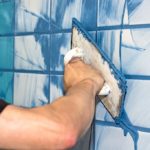As the popularity of using modern tiles to enhance more and more designs grows, the availability of grout for tile is keeping pace. Not only is today’s grout efficient, options like colors make it a more interesting part of the tile installation formula. Selecting the right tile for your Madison WI home is the No. 1 priority but the grout keeping it together must be a close second. With the right grout for tile the project looks great and wears well.
There are two basic types of grout for tile – Cement grout and Epoxy grout. There are subcategories within each group and several things to consider when making a choice.
Cement Grout For Tile
The standard of the tile installation business for years, cement grout hasn’t changed much over time. There are four basic divisions within this category – sanded, unsanded, high-performance and Polymer cement grout. These divisions are based on the grit of the material as well as designated uses:
- Sanded Cement Grout – has a grit of 1/8-inch or larger and is used for filling wider joints.
- Unsanded Cement Grout – has a grit of less than 1/8-inch and is better for narrow spaces.

Choosing the right grout for your tiling project impacts everything from installation and cleanup to ease of maintenance in years to come.
With so many options available today, most professionals are moving toward grout for tile that goes on easier and lasts longer.
- High-performance Grout – designed for more demanding applications like high-traffic areas these grouts meet high standards for shrinkage, water absorption and strength. Available in both sanded and unsanded versions.
- Polymer Cement Grout – adding plastic polymers to grout provides all the high-performance features plus extra water resistance, color consistency, abrasion resistance and chemical resistance.
Epoxy Grout – A New Standard
Epoxy grout for tile has become the new standard for many tile installations. It provides excellent cleanability, shrinkage, bonding, strength and chemical resistance properties. Epoxy absorbs about 50-times less water than traditional cement grouts, is twice as strong, and stands up to even the toughest environments.
Epoxy grout is a reactive product that is applied in two parts that mix together for a chemical reaction that gives epoxy all its best qualities.
TIP FROM A PRO — Mixing starts the “setting up” process, too, so it has to be applied quickly in small batches, especially in hot temperatures. Even experienced contractors can have difficulty with epoxy grout so it’s best to use a pro with experience with epoxy for best results.
There’s also a newer grout that’s labeled – Single Component Grout. It implies that it is an epoxy that doesn’t need the mixing action to work. It really isn’t an epoxy at all. Technically it is a urethane or acrylic-silicone resin formula. It has many of the benefits of a true epoxy and is often easier to apply, with less waste, than epoxy.
Selecting Grout For Your Tile Installation
There are many, many more options today than ever before and there are more developments in the science of grout for tile on the horizon. No one type is the best for every tile installation. As you go through the tile selection process, consider the appropriate grout options and evaluate the pros and cons of each.
Cement Grout…
Cement grout has its advantage:
- Can be used for most applications, indoors, outdoors, wet or dry
- Easy to work with
- Available to fit almost any size joint
- Sets up faster than most epoxy grouts
- Costs much less than most alternative
- Can be sealed for increased protection from water, cleaning agents, mold, mildew and bacteria
These positives have kept cement grouts at the forefront of tile installations for decades, but there are also drawbacks. Disadvantages include:
- Vulnerable to damage and discoloration in high-traffic, high-impact areas
- Can deteriorate when exposed to chemical compounds, cleaning agents
- Often provides inconsistent color because of uneven drying
- Subject to “efflorescence” – salty look because of basic chemistry in the product
- Not particularly stain or chemical resistant
- Requires more equipment, sponges, etc. than other options because apply grout wear on tools
- If not properly sealed water can seep into the grout where mold, mildew and bacteria can grow
Epoxy Grout…
The advantages are many:
- Low porosity so mildew, mold and bacteria cannot penetrate the surface
- Resists stains, scratches, cracks and chips
- Easy to clean – excellent choice for light-colored grout
- Consistent color
- Easy maintenance
There are some notable drawbacks to the use of epoxy grout for tile:
- Sealants can compromise the effectiveness of epoxy grout and shouldn’t be used
- Once it is mixed the formula must be used quickly or it loses its strength
- Must be mixed in small batches – increasing the overall time to complete the job
- Light colors can yellow when exposed to direct sunlight
- Can degrade when in contact with chemical cleaning agents
- Costs more than cement grouts
Single Component Grout…
While this newer choice is coming into its own, it too has good and not so good traits. The benefits include:
- Low porosity so mold, mildew and bacteria cannot penetrate
- Resists stains, scratches, cracks and chips
- Easy to keep clean – good choice for light colors
- Resists chemical cleaning agents
- Provides many of the positive properties of epoxy but is easier to work with
- Provides consistent color
- Easier and less expensive to maintain than cement grout
There are also disadvantage to consider:
- Using sealers can compromise the effectiveness of the grout and should not be applied
- Doesn’t work well with irregularly-shaped tile
- Cannot be used for such things as steam showers, pools or fountain
- Sensitive to extremes in both cold and hot temperatures
- Costs more than cement grout for tile
- Can take longer to apply than other options – difficult to work with for amateurs
- Can react to exposure to chemical cleaning agents
Professional Advice Makes Choices Clear
For reliable tile installation and tile selection, contact Molony Tile, a source for unique, durable and elegant tile solutions in Madison WI and greater Dane county
Call or email Molony Tile, 608-268-8453 to complete your tile installation plans and select the perfect grout for tile in your Madison WI area home.

